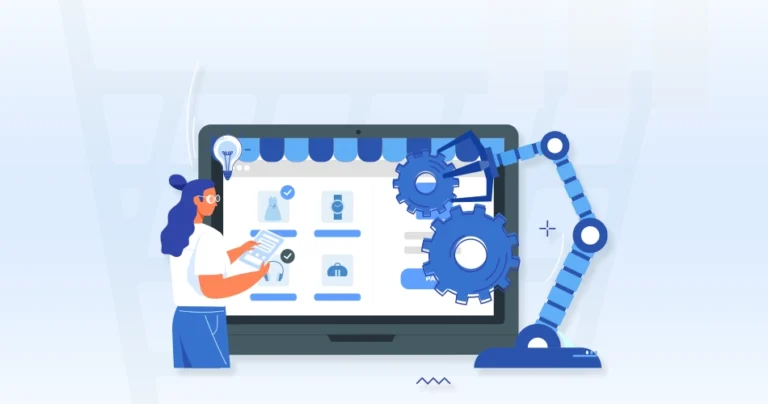An eCommerce business depends on a wide range of dynamic elements to ensure it runs flawlessly. You’ll need to keep up the order flow, address the customer inquiries, launch and run marketing campaigns, and more. But what if these repetitive tasks could be taken care of all by themselves. That’s the power of eCommerce automation.
You can use advanced tools and technology to automate repetitive tasks. It will free up valuable time and resources, so you and your business can focus on growth and innovation.
From automated marketing campaigns to inventory management, we’ll tell you how the eCommerce development services use automation on their eStore. Let’s begin.
What is eCommerce Automation?
eCommerce automation strategically streamlines repetitive tasks and processes within your online store. It’s like an assistant handling everything from inventory management to eCommerce marketing strategies and customer service.
Essentially, eCommerce automation utilizes software and technology to streamline and automate various tasks within your online store. It saves time, minimizes human error, and lets you scale up your business effectively.
Benefits of eCommerce Automation
Automation can be incredibly beneficial for eCommerce businesses. As we said, it’s like an automated assistant with benefits like:
Enhanced Efficiency and Productivity
Free your team from the shackles of repetitive tasks. Automation handles data entry, order processing, and social media management. So your employees can focus on strategic initiatives and customer interactions. This leads to a significant boost in overall productivity and efficiency.
Reduced Errors and Improved Accuracy
Human error is inevitable, especially in repetitive tasks. Automation minimizes these errors, ensuring accurate inventory management, order fulfillment, and data analysis. This leads to smoother operations and reduced costs associated with error correction.
Scalability and Growth Potential
As your business scales, handling increased workload becomes a challenge. Automation helps you seamlessly manage growth by streamlining processes and eliminating bottlenecks. This allows you to efficiently accommodate a larger customer base and expand your offerings without compromising on quality or service.
Personalized Customer Experiences
Automation empowers you to personalize the customer journey like never before. Trigger automated email campaigns based on customer behavior, offer targeted product recommendations, and provide 24/7 support through chatbots. There’s also an option of using push notification to send the customer personalized messages based on their preferences.
This fosters deeper customer engagement and loyalty, leading to higher conversion rates and repeat business.
Data-driven Decision Making
Gain valuable insights into your business performance with automated data collection and reporting. Track key metrics like sales trends, customer behavior, and marketing campaign effectiveness. This data-driven approach empowers you to make informed decisions that optimize your operations and drive further growth.
Cost Savings and Increased Profitability
By automating repetitive tasks, you free up employee time and resources, leading to cost savings in the long run. Additionally, improved efficiency and reduced errors contribute to increased profitability.
Competitive Advantage
In today’s competitive eCommerce landscape, automation gives your business a significant edge. By streamlining operations, personalizing customer experiences, and making data-driven decisions, you gain a clear advantage over competitors who rely on manual processes.
Basically, eCommerce automation helps you build a more efficient, scalable, and profitable online business.
How to Automate Your eCommerce Business?
Now that you understand the power of eCommerce automation, let’s dive into how you can implement it within your own business:
Step 1: Identify Areas for Automation
Analyze your current processes and pinpoint repetitive tasks that consume valuable time and resources. This could include tasks like data entry, order processing, social media management, email marketing, and customer service inquiries.
Step 2: Choose the Right Tools
A wide range of automation tools and software exists, each catering to specific needs. Popular options include:
- Marketing Automation Platforms (HubSpot, Mailchimp)
- Customer Relationship Management (CRM) systems (Salesforce, Zendesk)
- Workflow Automation Tools (Zapier, Integromat), etc.
Consider factors like your budget, technical expertise, and desired functionalities when selecting the right tools.
Step 3: Set Up Automated Workflows
Utilize the capabilities of your chosen tools to establish automated workflows. Define triggers (e.g., new order placed, abandoned cart), conditions (e.g., customer segment), and actions (e.g., send order confirmation email, trigger abandoned cart recovery campaign).
Step 4: Integrate with Your eCommerce Platform
Ensure seamless integration between your automation tools and your existing eCommerce platform (Shopify, WooCommerce, Magento). This allows for smooth data flow and efficient execution of automated tasks.
Step 5: Start Small and Scale Gradually
Don’t try to automate everything at once. Begin by automating a few key tasks and gradually expand as you gain comfort and confidence. This allows for easier troubleshooting and ensures you adapt your automation strategy effectively.
Step 6: Monitor and Analyze Performance
Regularly track the performance of your automated workflows. Analyze metrics like email open rates, customer engagement, and conversion rates to identify areas for improvement and optimize your automation strategy for maximum impact.
Step 7: Consider Consulting eCommerce Development Experts
For complex automation needs or extensive customization, collaborating with eCommerce experts can be invaluable. They can assess your specific requirements, recommend suitable tools and strategies, and provide technical expertise for seamless implementation.
Follow these steps and opt for eCommerce consulting services. They have a team of experts who understand every little part of your eStore. So they can help you with the best ways to automate the store. An eCommerce consulting agency is often involved to ensure automation aligns with business operations.
There are several tools that aim to automate the functionalities of an eCommerce website. Let’s take a look at the best eCommerce automation tools:
Marketing Automation Tools
These tools help streamline marketing tasks like email campaigns, social media management, and targeted advertising. Popular options include:
- Klaviyo: Designed specifically for eCommerce, Klaviyo excels in personalized email marketing, abandoned cart recovery, and customer segmentation.
- HubSpot: Offers a comprehensive marketing suite with features like email marketing, social media scheduling, landing page creation, and marketing analytics.
- Mailchimp: A user-friendly option for email marketing, Mailchimp provides basic automation features and affordable pricing plans.
Inventory Management Tools
These tools automate stock level tracking, order fulfillment, and reordering, ensuring smooth operations and avoiding stockouts. Popular options include:
- Linnworks: A powerful inventory management solution offering features like barcode scanning, sales forecasting, and real-time analytics.
- Square: Provides inventory management functionalities within its point-of-sale system, ideal for smaller businesses.
- Fishbowl: A robust inventory management software for larger businesses, offering advanced features like multi-warehouse management and production planning.
Customer Relationship Management (CRM) Systems
These tools help manage customer interactions, track order history, and provide personalized support. Popular options include:
- Salesforce: A leading CRM platform offering features like contact management, lead scoring, and customer service automation.
- Zendesk: A user-friendly CRM solution with built-in features for helpdesk management, live chat, and customer self-service portals.
Workflow Automation Tools
These tools allow you to create custom workflows that automate repetitive tasks across different platforms. Popular options include:
- Zapier: Connects various apps and services to automate tasks based on pre-defined triggers and actions.
- Integromat (Now Make): Similar to Zapier, offering powerful automation capabilities with a visual interface for building workflows.
If you are selling your products through Shopify, then Shopify Flow would help. This native automation tool within Shopify takes care of tasks like order confirmation emails, abandoned cart recovery, and product recommendations.
If you need help, we suggest you consult with our hire eCommerce web developers. We will help you identify the ideal mix of automation tools to maximize the efficiency and growth of your online business.
Conclusion
eCommerce automation uses technology and software solutions to streamline and optimize various operational processes within an online retail business. It can help you save time and resources while improving customer satisfaction and boosting sales.
Here’s how eCommerce automation is implemented:
- Identify Areas for Automation
- Choose the Right Tools
- Set Up Automated Workflows
- Integrate with Your eCommerce Platform
- Start Small and Scale Gradually
- Monitor and Analyze Performance
Need help with automating your eCommerce business? Then let’s have a consultation today!
FAQs on eCommerce Automation
Q1. Do I need a developer to automate my eCommerce business?
While some basic automation can be set up with user-friendly tools, complex automation or extensive customization might require the assistance of eCommerce development experts.
Q2. Is eCommerce automation expensive?
The cost of automation varies depending on the tools you choose and the level of customization required. However, the long-term benefits in terms of efficiency, cost savings, and growth potential often outweigh the initial investment.
Q3. Will I lose control when I automate my online store?
Automation doesn’t mean giving up control. You can set parameters and rules for automated tasks, allowing you to maintain oversight and make adjustments as needed.

